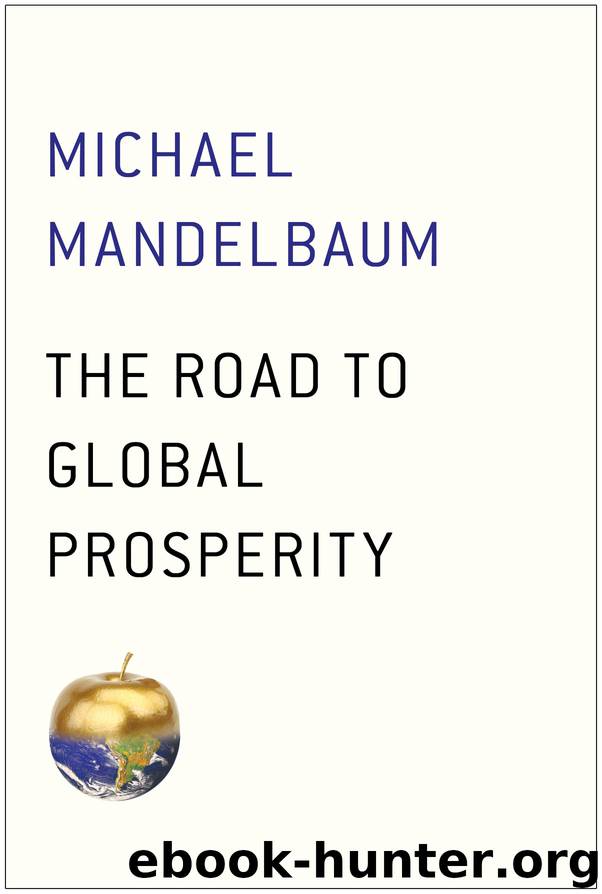The Road to Global Prosperity by Michael Mandelbaum

Author:Michael Mandelbaum
Language: eng
Format: epub
Publisher: Simon & Schuster
Brazil: The Perils of Populism
“Brazil is the country of the future,” goes an old saying, “and always will be.” In the twentieth century the country had a reputation for having the world’s best coffee, its most beautiful beaches at Ipanema and Copacabana, its most creative and alluring dances—film’s greatest dancing couple, Fred Astaire and Ginger Rogers, made their screen debut in Flying Down to Rio in 1933, introducing to the world “the Carioca”—and for unfulfilled economic potential.
That potential is vast. Brazil is the world’s fifth-largest country in both area and population. It has large stretches of arable land some of which is so fertile that it yields three crops per year, substantial natural resources, the world’s largest freshwater supply, an extensive Atlantic coastline with several good ports, and borders with every other South American country except Chile.15
In the twentieth century the approach to governance found throughout Latin America and known as populism, while producing growth for a time, ultimately held the country back economically. In the 1990s an economic shock led to a change of course in economic policy and Brazil at last began to fulfill its potential, achieving growth steady enough and high enough to qualify it for membership in the BRICs. Sustaining that growth will require keeping the forces of populism at bay.
The precise form populism took varied from one Latin American country to another but in Brazil, as almost everywhere else, it had three main elements: a strategy for economic growth, a large economic role for the government, and a particular political style.
Brazil’s populists followed the strategy of import-substituting industrialization.16 The government imposed tariffs on imports in order to protect local industries—steel, aluminum, automobiles, and shipbuilding among others. It provided subsidies to these industries, controlled the country’s exchange rate, and allocated foreign exchange to strengthen them. In some cases it assumed direct responsibility for ownership and management.17
Under populism the government not only sought to promote a local industrial base, it also, in keeping with the populist commitment to enhance the people’s welfare, provided financial benefits to many Brazilians. It established a generous pension system. By owning and managing firms in important sectors of the economy, it created jobs and paid high wages to the employees of these firms as well as to the bureaucrats in the ever-expanding departments of the government itself.18 All this made public spending consistently high.
As for politics, populism emphasized the national leader at the expense of institutions. Populist leaders asserted, and drew their claims to govern from, a direct connection with the people. In fact, in Brazil they relied for political support not on all of the people but mainly on the workers and lower middle classes of the cities. The country’s twentieth-century leaders did not always hold power by virtue of free elections.19
Brazilian populism’s economic record in the years after World War II was eminently respectable. Between 1947 and 1962 the size of the country’s industrial sector more than tripled and its average yearly growth rate exceeded 6 percent.20 Overall, from 1950 to 1975 the country grew at 7 percent per year.
Download
This site does not store any files on its server. We only index and link to content provided by other sites. Please contact the content providers to delete copyright contents if any and email us, we'll remove relevant links or contents immediately.
International Integration of the Brazilian Economy by Elias C. Grivoyannis(110906)
The Radium Girls by Kate Moore(12019)
Turbulence by E. J. Noyes(8040)
Nudge - Improving Decisions about Health, Wealth, and Happiness by Thaler Sunstein(7694)
The Black Swan by Nassim Nicholas Taleb(7113)
Rich Dad Poor Dad by Robert T. Kiyosaki(6613)
Pioneering Portfolio Management by David F. Swensen(6291)
Man-made Catastrophes and Risk Information Concealment by Dmitry Chernov & Didier Sornette(6009)
Zero to One by Peter Thiel(5789)
Secrecy World by Jake Bernstein(4743)
Millionaire: The Philanderer, Gambler, and Duelist Who Invented Modern Finance by Janet Gleeson(4471)
The Age of Surveillance Capitalism by Shoshana Zuboff(4279)
Skin in the Game by Nassim Nicholas Taleb(4240)
The Money Culture by Michael Lewis(4198)
Bullshit Jobs by David Graeber(4180)
Skin in the Game: Hidden Asymmetries in Daily Life by Nassim Nicholas Taleb(3993)
The Dhandho Investor by Mohnish Pabrai(3760)
The Wisdom of Finance by Mihir Desai(3735)
Blockchain Basics by Daniel Drescher(3574)
